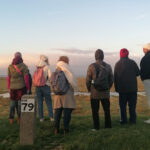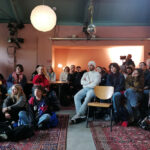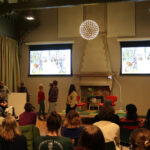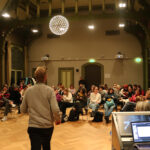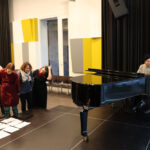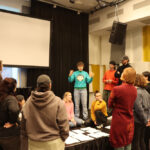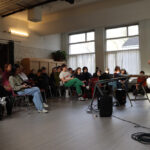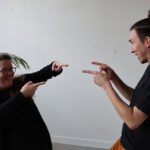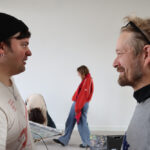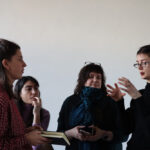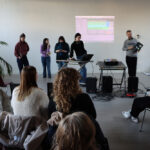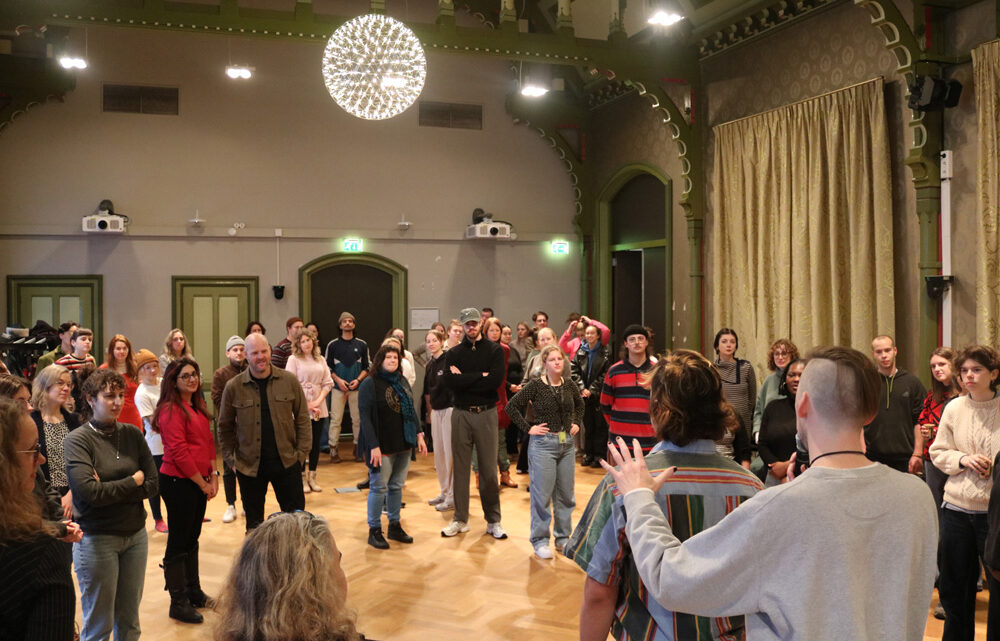
Co-Creativity & Collaboration
Collaborative Working and Co-Creativity: Experiences from a U!REKA BIP Visit to Groningen. Noay Ay, Elias Runer, Xenia Scheuffele (Frankfurt UAS)
The Blended Intensive Program (BIP) in Groningen as part of the U!REKA Lab: Co-Creativity in Social Arts offered us students a unique opportunity to experience co-creativity and collaborative creative design in an interdisciplinary and international environment. In changing constellations, we worked together with students from the fields of social work, art and music from the U!REKA universities in Ghent, Helsinki and Frankfurt, as well as the partner university Hanze Groningen, and tried out a variety of creative methods.
In addition to the excursions to places of commons and collaborative co-production, the co-creation workshops, in which we used techniques such as brainstorming, sketching and storytelling, were particularly influential. The workshops focussed less on achieving a fixed result and more on shaping creative processes and presenting new ideas on various topics with open artistic media.
An important methodological approach was Art-Based Research, which was implemented differently, depending on the group and background of the international teams of coaches. One example of this was the Sound Research group, which was led by Nicholas Robinson (Prins Claus Conservatorium, Hanze UAS, Groningen) and Raul Gschrey (Frankfurt UAS) and dealt with sound as a means of communication and a form of expression. This approach encouraged us to work experimentally and discover new artistic perspectives. The work in the group made it clear to us that sound can be used beyond language as a form of expression to convey emotions and social issues. Storytelling and narrative methods also played a decisive role. In the “Amplifying Voices through Creativity” workshop by former students of the Prins Claus Conservatorium in particular, these methods helped to build emotional connections within the group. Especially at the beginning of the program, this made it easier to get to know each other and created a basis of trust for further collaboration.
In Search of Common Grounds
Despite different interests, expectations and competencies, it was clear after two days in Groningen that we had found “common ground” with many participants or developed it over the course of the week. The connection to the students from other degree programs in Frankfurt and the Belgian Bachelor’s students was particularly strong. The discussions with the Master’s students from Finland were also interesting: despite the age difference, we discovered many shared experiences and perspectives. The shared connection became particularly clear through a creative exercise in Wongema, in which we explored our sense of home through drawing and presented our results. This exercise showed impressively how artistic forms of expression can help to share individual experiences and develop a common understanding, a “common ground”.
New Methods, Approaches and Positions
Our experiences in Groningen have shown us the added value of an interdisciplinary and international Lab for co-creativity. The open, experimental approach encouraged creative processes that went beyond traditional teaching methods. The collaboration with students from different countries opened up new perspectives on social challenges and creative solutions. The freedom to set our own priorities and work outside of fixed guidelines was particularly enriching. This not only strengthened our creativity, but also our critical thinking and ability to reflect.
Another important aspect was the application of creative approaches in social work in an international context. In this context, a lecture by Dr. Anke Coumans at the Prins Claus Conservatorium (PCC) gave us insights into practical projects that deal with the interface between art and social work. One example of this was a project on artistic portraits of elderly citizens with dementia, which impressively demonstrated how creative methods can be used to facilitate new forms of communication and participation.
A Lasting Experience
The intercultural collaboration made us realize how differently creative processes can be designed and how much we can learn from each other. A Lab like this within the U!REKA European University network creates valuable opportunities for students to actively engage with social issues and develop new creative solutions. Our experience shows that co-creativity is not only an artistic process, but also an effective means of social and societal transformation. This is why as many students as possible should be given the opportunity to develop their interdisciplinary skills in such a framework and to explore new paths together.

